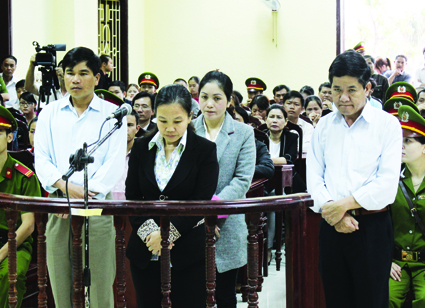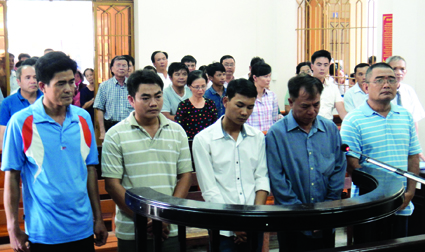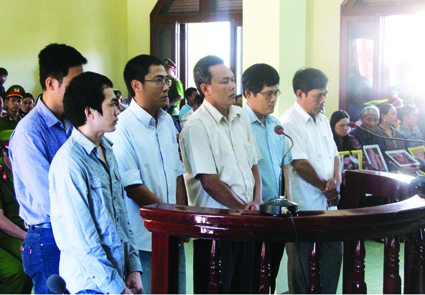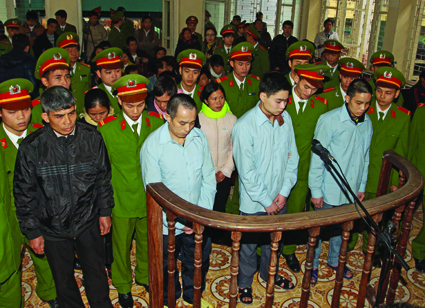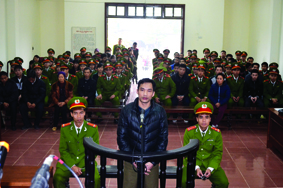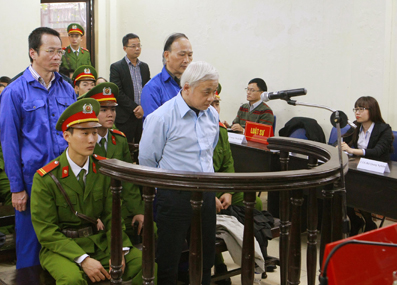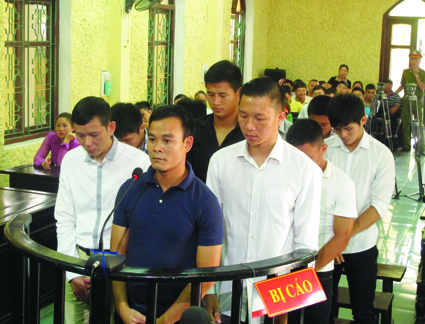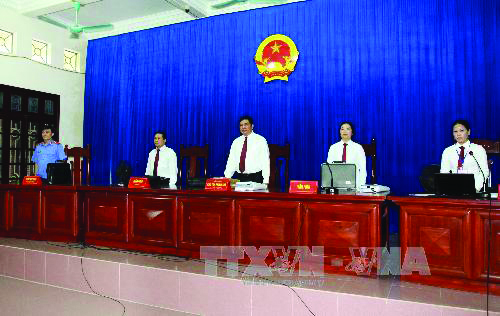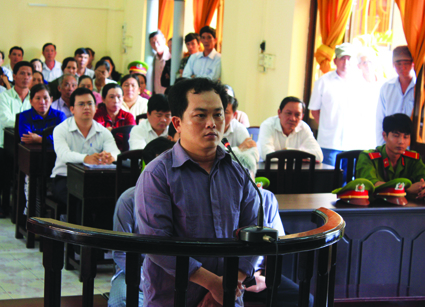Pham Minh Tuyen, LL.D
Chief Justice, People’s Court of Bac Ninh province
Though the 2003 Criminal Procedure Code (the Code) has no specific provision on fair trial, a number of articles and principles established in the Code thoroughly address the right of every person to a fair trial in criminal justice. However, there remain some limitations that have rendered the Code unable to fully meet requirements of the crime prevention and suppression in the new situation, especially guaranteeing the right to a fair trial. These limitations should be overcome by introducing more specific provisions to assure citizens of a swift and full access to justice. Below are some analyses about the limitations as well as recommendations to guarantee the right to a fair trial in criminal proceedings.
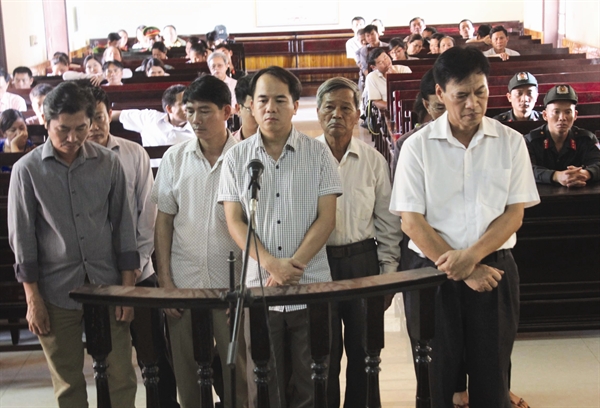 |
| Defendants prosecuted for acting against state regulations on economic management in the payment of compensations for ground clearance for Ben Thuy II bridge project in Ha Tinh province __Photo: Phan Quan/VNA |
Some limitations
The right to silence in Vietnam’s criminal law
The Code does not officially provide the right to silence. This right can only be perceived under Article 10 which says that a suspect (arrested before the institution of a criminal case), an accused or a defendant has the right but is not obliged to prove his/her innocence. That can be understood such person may provide evidence to prove he is not guilty, for example giving evidence that at the time the crime is committed, he was not at the crime scene or that someone else has committed the crime. If, for some reasons, the arrestee, accused or defendant refuses to prove his innocence, procedure-conducting agencies may still not treat him as an offender if having no evidence to charge him.
However, the above perception is merely theoretical and meaningful only to jurists. Law enforcement officials rarely have such perception and act upon it in practice, whilst suspects and arrestees do not know the right to silence and their being entitled to exercise it. In our opinion, unless the right to silence is proclaimed in the criminal procedure law, the right to a fair trial can hardly be guaranteed in criminal justice.
The right to counsel of persons held in custody, the accused and defendants
As per Articles 11, 48, 49, 50, 56, 57 and 58 of the Code and a number of implementing regulations, the right to counsel of persons held in custody, the accused and defendants is a primary right in criminal justice though the practical application of this right still has limitations, including improper and different understandings of procedure-conducting persons or appointment of defense counsels who are not knowledgeable about criminal law, thus making the adversarial process at court hearings unsatisfactory.
The provisions of the Code’s Article 56 on defense counsels in criminal proceedings seem to be no longer appropriate and difficult to apply at different procedural stages, especially that concerning people’s advocates. In fact there are very few cases in which people’s advocates participate in the defense and adversarial process at court hearings. Moreover, to date there are no legal documents specifying agencies and organizations responsible for managing people’s advocates as well as criteria for acting as people’s advocates. In most cases, relatives or lawful representatives of the accused or defendants who are granted counsel certificates do not know much about legal provisions they should rely on to provide defense and shed light on the cases. None of them has been offered to study the case files. Even the participation of defense lawyers, who are defined in Article 10 of the Law on Lawyers as “possessing a law bachelor degree, having been trained in law practice and having gone through a period of law practice probation,” is not enough to guarantee a fair trial as not a few of them fail to make persuasive arguments in the adversarial process. This reality has somehow made the adversarial process at court hearings unfruitful, affecting the right to a fair trial.
Clause 1, Article 57 of the Code stipulates: “Defense counsels shall be selected by persons kept in custody, the accused, defendants or their lawful representatives.” This provision has led to a common situation that defense counsels invited by lawful representatives of persons kept in custody, the accused or defendants, who are adults, are not accepted by procedure-conducting agencies for the reason that such invitation needs the consent of the persons kept in custody, the accused or defendants. As guided in Resolution No. 03/2004/NQ-HDTP dated October 2, 2004, of the Judicial Council of the Supreme People’s Court, defense counsels for persons who are full eighteen years or older and have no mental or physical defects can only be selected by such persons or by such persons’ relatives after asking for their consent. However, in case the accused or defendant is being held in a detention camp, his relative can hardly meet him and ask for his consent to the invitation or his hand-written request for a defense counsel (Articles 48, 49 and 50 of the Code merely provide the right of these persons to defend themselves or ask other persons to defend them). Therefore, their right to counsel is restricted, especially at the stage of investigation, because no defense counsel can be granted a counsel certificate by the investigative agency to meet a person held in detention without the latter’s written request.
The effective exercise of rights and obligations of defense counsels provided in Article 58 of the Code also depends heavily on the cooperative attitude of procedure-conducting agencies because of the provision that the defense counsel may ask questions to his client only when the investigator so agrees. Another provision that the defense counsel has to hand over to the investigative agency, procuracy or court all documents and objects related to the case which he has collected may also put the defense counsel and his client at a disadvantage in the course of defense, thus affecting the right to a fair trial.
Return of case files for additional investigation
The grounds for the court to return a case file for additional investigation are established at Points a, b and c, Clause 1 of Article 179 of the Code as follows:
“a/ Where important evidence in the case needs to be further examined, which cannot be supplemented at the court hearing;
b/ Where there are grounds to believe that the defendant has committed another offense or there is another accomplice;
c/ Where a serious violation of the procedure is detected.”
These provisions seem to hardly guarantee the right to a fair trial, if not the contrary, because the burden to prove a person guilty rests with procedure-conducting agencies, especially the investigative agency and procuracy, and the return of the case file by the court for additional investigation for a reason, say, serious violation of the procedure, might help the investigative agency correct their previous mistakes. For example, they can seek to legalize the incriminating evidence or disprove the suspect’s alibi, etc., in an attempt to prove the charged crime. That is unfair to the charged person.
Expert examination
Expert examination is crucial for the determination of crimes and penalties. However, the provisions of Articles 60, 155, 156, 157, 158 and 159 of the Code, especially those concerning when expert examination must be solicited, expert conclusion on temporary or permanent injuries of victims, expert re-examination, etc., are not specific enough to help guarantee the right to a fair trial.
Recommendations
In order to guarantee proper exercise of the right to counsel, the Code should directly spell out the right to silence of persons held in custody, the accused and defendants so that they can refuse to make statements or testimonies and remain silent until a defense counsel is present. Only so, can extortion of statements or testimonies and use of corporal punishment against the suspects be prevented.
Regarding counsel, the Code should provide that in all circumstances, the persons held in custody, the accused or defendants who are adults and have no physical and mental defects as well as their relatives can invite defense counsels. Still, these persons may refuse defense counsels appointed by procedure-conducting agencies or invited by their relatives and select others by themselves.
The cases specified in Clause 2, Article 57 of the Code should be regarded as the cases in which the presence of a defense counsel is compulsory and, therefore, the provision that the accused or defendant and his lawful representative still have the right to request the change of, or refuse to have, a defense counsel is no longer appropriate. This is because the defense counsel is responsible for not only defending his client but also helping clarify facts of the case and safeguard justice.
A defense counsel should be entitled to ask questions to his client without having to ask for the consent of investigators and be informed in advance by the investigative agency of the time and place of interrogation.
Stricter provisions on return of case files for additional investigation should be added to prevent procedure-conducting agencies from colluding with one another in seeking to incriminate persons held in custody, the accused or defendants. It is suggested that these persons be declared innocent if investigation results fail to prove the charges against them.
The Code should set a time limit for soliciting expert examination when expert examination conclusions are required, and specify professional agencies competent to assess the accuracy of examination conclusions in case re-examination or additional examination is needed, aiming to avoid the situation that subsequent examination conclusions automatically supersede previous ones as at present.
There should be guidelines on the settlement of cases involving victims suffering temporary and permanent injuries, determination of crimes and penalties based on the aggregate injury rate of victims, and measures to compel examination, re-examination or additional examination of victims’ injuries.
To improve the quality of the adversarial process at court hearings in the spirit of the Political Bureau’s Resolution No. 08-NQ/TW, and Resolution No. 49-NQ/TW dated June 2, 2005, the inquiring sequence established in Article 207 of the Code should make clear that procurators are the first to put questions, followed by defense counsels, while the trial panel may only raise suggestive questions when necessary.
The Code should additionally prescribe the turn for victims or their lawful representatives to make questions and arguments in the adversarial process in the cases which are instituted at their request.-
